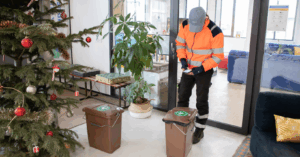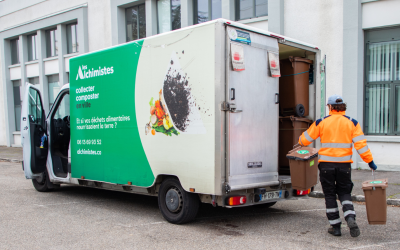Since the Regulations on foodwaste came into force, managing bio-waste is no longer optional: all businesses must now adopt an effective solution for sorting and recycling their organic waste.
But in practical terms, how is collection organised? What are the benefits and challenges for your organisation? And above all, how can you optimise your costs while remaining compliant with regulations?
In this article, Easy To Compost reveals:
- The advantages and disadvantages of different solutions for collecting bio-waste in businesses
- Real-life feedback from a company such as Decathlon and the reasons behind its choice
- Advice on how to reduce the cost of managing your bio-waste, whatever the size of your organisation
- A personalised estimate of the cost of collection based on your volume of bio-waste
Discover how to turn this regulatory constraint into a real opportunity for your business, thanks to tailored solutions that are accessible for all volumes.
What is bio-waste collection?
Biowaste collection refers to the separate collection of organic waste from our daily activities. This waste includes, in particular:
- Food waste: leftovers, fruit and vegetable peelings, stale bread, etc.
- Green bio-waste: grass clippings, dead leaves, tree branches, wilted flowers.
- Other organic waste: coffee grounds, coffee filters, tea bags, etc.
Unlike traditional household waste, which is incinerated or buried, biowaste is intended to be recycled. It can be transformed into compost, a natural soil conditioner, or into biogas through methanisation.
The distinction between waste and biowaste is fundamental. Separate management of biowaste prevents contamination of recycling streams and optimises its recovery.
How does bio-waste collection work for a business?
The process of collecting bio-waste in businesses generally involves several steps:
- Sorting at source: Employees or users sort their organic waste into specific bins (often brown or black bin bags).
- Regular collection: A dedicated collection service provider regularly collects the full bins (frequency varies depending on the volume produced: once a week, twice a week, etc.).
- Transport and treatment: The biowaste is transported to a sorting centre or a methanisation platform for recovery.
- Waste recovery: The biowaste is transformed into compost or biogas, thus contributing to the production of renewable energy and natural fertilisers for agriculture.
The organisation may vary depending on the region and local regulations. In some municipalities, collection is provided by the local authority, while in others it is outsourced to private companies. It is also possible to set up a separate collection system with several voluntary drop-off points on the company’s premises.
Since January 2024, the AGEC law has made it compulsory for establishments (restaurants, industrial companies, shops, etc.) to sort bio-waste. The implementation of an effective system is therefore essential to comply with the legislation.
Advantages and disadvantages of bio-waste collection
The collection of bio-waste has several advantages:
- Positive environmental impact: Reduction in greenhouse gas emissions, improved soil quality thanks to compost, production of renewable energy (biogas).
- Resource recovery: Transformation of waste into useful raw materials for agriculture and industry.
- Social and environmental responsibility (CSR): Positive image among customers, partners and employees.
- Circular economy: Reduction in the amount of waste sent for incineration or landfill.
However, it may have some disadvantages for some people:
- Cost: Setting up a dedicated collection system may incur additional costs (purchase of bins, collection fees, etc.). Everything is relative, as it is a requirement of the AGEC law, and your time and energy should be devoted to your business rather than to your core activities.
- Logistics: Need to organise sorting at source and manage waste flows.
- Potential nuisances: Odours, gnats, rodents if the system is not properly maintained.
- Difficulties in estimating actual production volume: It can be difficult for small businesses to predict their collection needs. That’s why at Easy To Compost we can calculate this estimate for you.
Alternatives and complementary solutions to collection
To mitigate these drawbacks, there are alternatives or complementary solutions to bio-waste collection:
- On-site pre-composting: Installation of a collective composter to transform organic waste directly at the production site. This is an ideal solution for reducing waste volumes and recovering resources locally.
- Anaerobic digesters: A system that transforms biowaste into biogas through a fermentation process, suitable for businesses that produce large volumes of organic waste.
- Compost & Collect Easy To Compost: Our innovative solution combines the advantages of on-site composting and outsourced collection. We install a smart composter that optimises the composting process while minimising nuisance and logistical constraints. A regular collection service ensures that mature compost is removed and bins are replaced if necessary.
Frequently asked questions about bio-waste collection
What are the current regulations regarding the collection of bio-waste for businesses?
The AGEC law requires businesses that produce organic waste to set up a sorting and recycling system.
What types of waste can be collected?
All food waste (leftovers, peelings), green bio-waste (grass clippings, dead leaves) and certain other organic waste (coffee grounds, coffee filters).
How do I choose the right collection service provider?
It is important to consider the collection frequency, prices, environmental guarantees and certifications of the service provider.
What is the most economical option for my organisation?
The choice depends mainly on the volume of bio-waste you produce:
- For volumes exceeding 5 tonnes per year, outsourced collection is generally the most economical and practical solution. It allows you to benefit from logistics tailored to large quantities, while optimising costs.=
- For volumes of less than 5 tonnes per year, on-site composting, possibly supplemented by occasional collection of surplus waste, is often preferable. This option limits transport costs and recycles your waste directly on site, provided you have the necessary space and are able to manage the process.
To put it simply: for more than 5 tonnes per year, opt for collection; for less than that, compost on site.
In practical terms, how does bio-waste collection work?
The process is quite simple:
- Bins and containers: Easy To Compost provides you with bins (usually 60L, 120L or 240L) suited to your needs. In some cases, service providers provide several bins per site. These bins require approximately 1m² of floor space for proper handling. They are equipped with lids to limit odours and access by pests.

- Waste sorting: Your teams sort organic waste into these specific bins. A clear, illustrated sorting guide can facilitate this process.
- Collection: Our teams collect the full bins at the agreed frequency (weekly, fortnightly, etc.). Collection is usually carried out by a truck dedicated to organic waste.

- Who empties the ‘bio bin’? Internally, a designated person is responsible for regularly emptying the small containers (bio bins) into the main bin.
Where should I store the bio-waste collection bins?
It is best to store the bins indoors or sheltered from the weather, in a location that is easily accessible for collection and well ventilated to prevent odours. A dedicated, clean and dry location is ideal. Keep them away from food preparation areas.
What solutions are available to limit nuisances (odours, midges, etc.)?
Easy To Compost supports you by providing:
- Airtight, well-maintained bins
- Strict sorting guidelines
- Appropriate collection frequency to avoid prolonged waste storage.
- For on-site composting, we offer odour control solutions and advice on how to limit pests.
Collection of bio-waste in large cities such as Paris and Lyon
Easy To Compost operates in several French cities to support businesses and local authorities in their organic waste management initiatives.
- Paris: Faced with urban environmental challenges, Paris is stepping up its efforts to collect bio-waste. Easy To Compost offers solutions tailored to Parisian establishments (restaurants, hotels, shops, etc.).
- Lyon: Lyon is a city committed to ecological transition. We support Lyon-based companies in setting up efficient and sustainable systems for collecting their bio-waste.
- Clermont-Ferrand: We offer solutions tailored to the specific characteristics of the Auvergne region, with a focus on local composting and the recovery of regional resources.
- Strasbourg: The city is committed to the circular economy. Easy To Compost offers innovative solutions for Strasbourg-based businesses concerned about their environmental impact.
- Montpellier: We operate in Montpellier and the surrounding area, offering personalised services tailored to the needs of different types of businesses (hotels, restaurants, shops, etc.).
Please do not hesitate to contact us for a free audit of your food waste and to find the solution best suited to your needs!

